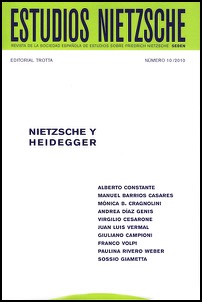Paul of Tarsus as a moment of encounter/mismatch of early Heidegger with Nietzsche
DOI:
https://doi.org/10.24310/EstudiosNIETen.vi10.10184Keywords:
resentment, hope, faithAbstract
The aim of this paper is to show analogies and contrasts between Heidegger’s and Nietzsche’s interpretation of the Pauline Epistles. The first step is to show the ambiguity of Paul’s figure in Nietzsche’s thought and his connection with Jesus of Nazareth. Paul, founder of Christianity, created a religion of resentment, empowering the powerless. Heidegger, far from Nietzsche’s philosophical moral approach, reads Paul to investigate the roots of religious life: the Pauline Epistles , above all, deal with the awaiting of Parousia, which, far from being a mere hope, is the completion of all believer’s life.
Downloads
Metrics
References
Brejdak, J., Philosophia crucis: Heideggers Beschäftigung mit dem Apostel Paulus, Frankfurt a.M.: Lang, 1996.
Brito, E., «Heidegger e il problema dell‘esperienza religiosa in Friedrich Schleiermacher e Rudolf Otto»: Annuario filosofico 15 (1999), 421-448.
Havemann, D., Apostel der Rache. Nietzsches Paulus Deutung, Berlín: W. de Gruyter, 2003.
Hirsch, E, «Nietzsche und Luther – Mit einem Nachwort von Jörg Salaquarda», en Nietzsche-Studien 15 (1986), 398-439.
Nietzsche, F., Obras Completas, I-IV (OC ). Director ed. Diego Sánchez Meca. Madrid: Tecnos, 2011-2016
Nietzsche, F., Correspondencia I-VI. (CO). Director ed. Luis E. de Santiago Guervós. Madrid : Trotta, 2005- 2012.
Nietzsche, F., Fragmentos Póstumos I-IV (FP). Director ed. Diego Sánchez Meca. Madrid: Tecnos, 2006-2010.
Patriarca, S., «Heidegger und Schleiermacher – Die Freiburger Aufzeichnungen zur Phänomenologie des religiösen Lebens (1918-1919)»: Heidegger Studies V18 (2002), 129-155;
Piazzesi, C., «Nietzsche lettore di Pascal», en M.C. Fornari (ed.), La trama del testo – Su alcune letture di Nietzsche, Lecce: Milella, 2000, pp. 167-221.
Downloads
Published
How to Cite
Issue
Section
License
As of issue 21 (2021) this journal is published only in open access (diamond route).
From that number 21, like the previous numbers published in NIETZSCHE STUDIES, they are subject to the Creative Commons Acknowledgment-NoComercia-ShareIgual 4.0 license, the full text of which can be consulted at <http://creativecommons.org/licenses/by-nc-sa/4.0 >
It is the responsibility of the authors to obtain the necessary permissions of the images that are subject to copyright.
This work is licensed under a Creative Commons Attribution-NonCommercial-ShareAlike 4.0 International License.
Copyright generates two different rights: moral rights and patrimonial rights that EJFB recognizes and respects. Moral rights are those relating to the recognition of the authorship. They are rights of a personal nature that are perpetual, inalienable, unseizable and imprescriptible as consequence of the indivisible union of the author and his/her work.
Patrimonial rights are those that can be derived from the reproduction, distribution, adaptation or communication of the work, among others.







11.png)
